Over the last few days they have been quite a few articles and comments made about the recent rise in oil and gasoline prices.There is a growing consensus among the mainstream analyst community that "this time is different" because the rise in oil prices, and the subsequent rise in gasoline prices (as we predicted), haven't cracked the economy. 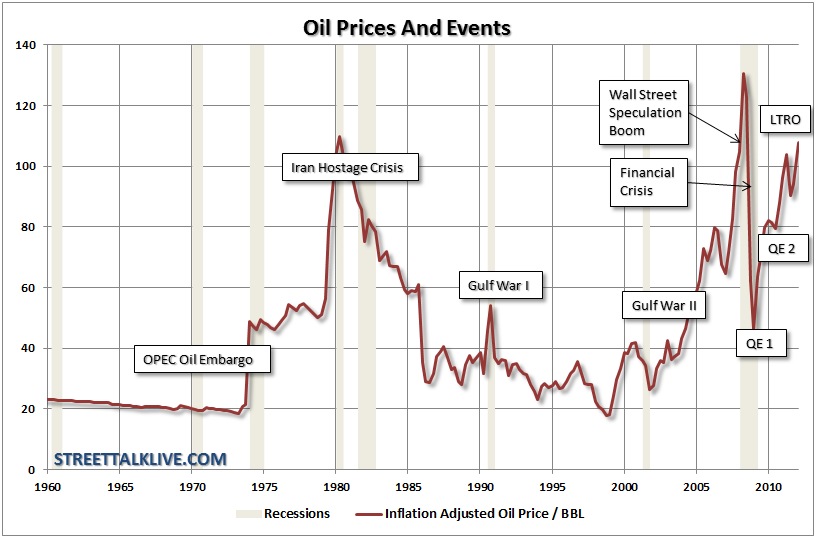
Recently Liz Ann Sonders from Charles Schwab stated that: "At some point, a continued surge would be a risk to the positive market and economic outlook I've had for some time, but at this stage it's not a deal-breaker for the recovery. For one thing, in the past century, the real price of gasoline has spent almost all its time between $2 and $4 (in current dollars), and we're within that range today.
Yes, oil price spikes preceded the 1973, 1980, 1991, 2001 and 2007 recessions, but the spike in early 2011 did not lead to one, and I believe the current spike will also be an exception. US consumers are now much better positioned to weather higher energy prices, with well-improved job growth and consumer confidence, credit growth picking up, aggressive Fed stimulus and record-low natural gas prices. Most important is the fact that energy price inflation last year was largely spurred by the second round of quantitative easing by the Fed (QE2), whereas today's driver is global growth."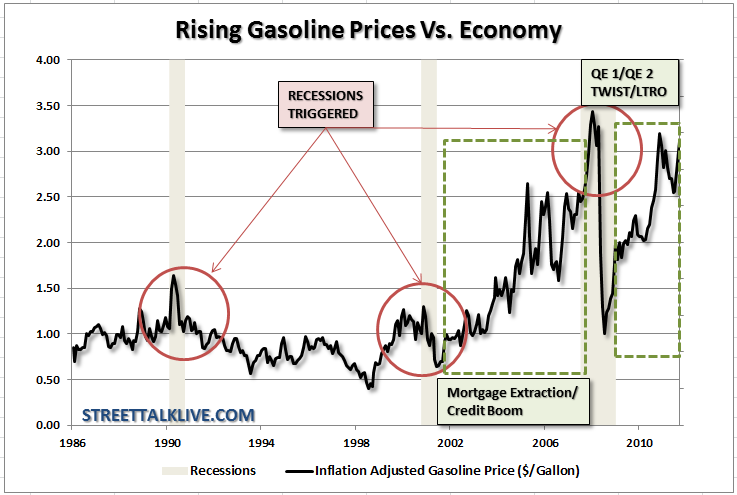
Liz is correct on a couple of points.Natural gas prices are near historic lows but those low prices aren't necessarily being passed on by utility companies to the end consumers as witnessed by the rise in the consumer price index of fuel and utlities. She is also right that the spike in oil in 2011 did not lead to a recession. However, the economy did contract sharply and without QE 2 and the introduction of Operation Twist, the ongoing Permanent Open Market Operations and LTRO, it is arguable whether or not the economy would have potentially slipped into a recession. However, for a few trillion dollars you too can buy an economic recovery.
As far as gasoline goes, utilizing the data provided by the Federal Reserve Board, I have created an inflation adjusted gasoline price chart. Sharp rises in gasoline prices have led to economic contractions in the past. Had it not been for the massive mortgage equity extractions and explosion in credit between 2005-2007 it is likely that a recession would have set in sooner.Likewise the current rise in gasoline prices, along with oil prices, have not impacted the economy...yet. However, again, the shear fact that the economy has not slipped at this point is due to the ongoing injections of liquidity into the economy as witnessed by the chart of M2 Money Supply versus inflation adjusted oil prices.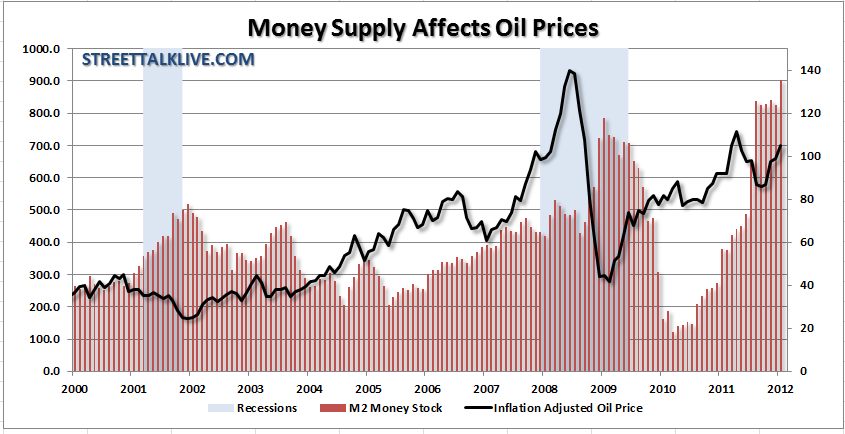
With M2 surging to a new record high in recent months it is not unlikely that we will continue to see oil prices rise further, along with gasoline. As oil prices rise so do input costs to companies and prices to consumers. It is somewhat naive to think that just because a recession hasn't occured as of yet - that it won't. In fact, had it not been for the collapse in oil prices during 2011 from over $100 a barrel to below $80, as the economy shrank to only slightly above the zero line, a recession would have ensued. 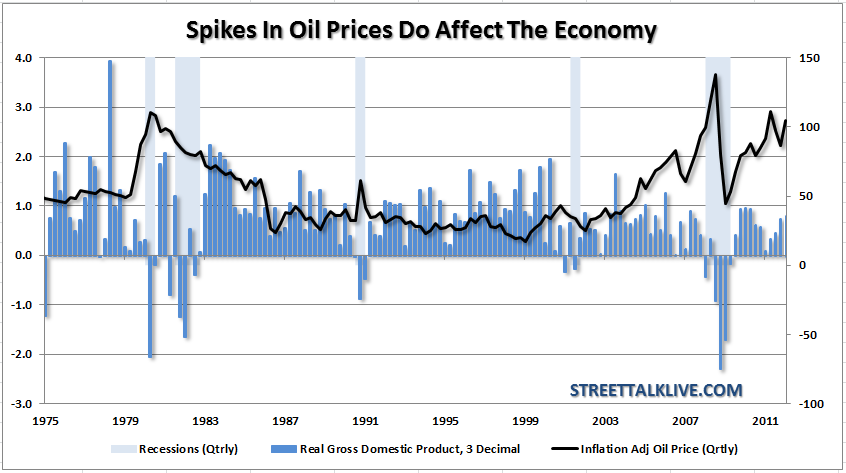
In a bit of disagreement with Liz, while there are some slight improvements in the underlying economic fabric, the consumer, as a whole, is effectively worse off today than they have been at any other time in this century. With 1 in 4 homeowners underwater in their mortgage, 86 million no longer counted as part of the workforce, 47 million on food stamps, real unemployment still at recessionary levels along with consumer confidence - it will not take oil prices at these lofty levels for very long to erode the economy even with continued liquidity injections.
Liz states that employment is improving.That statement would be true if you look only at the BLS measure of employment.However, it is the entire population that affects the economy. Just because someone is retired, unemployed, working part-time or are a stay-at-home spouse; they still consume at some level.Their ability to consume is affected by the cost of oil as it affects everything that we consume or use.The chart of employment-to-population ratio relative to the rise and fall of oil prices gives us a much better image of the impact on rising input costs to companies and underlying employment.If this chart holds true the recent improvement in employment that we have seen, which has primarily been temporary hires, will be fleeting and the employment to population ratio is likely to decline further.As my father used to say; "That ain't good"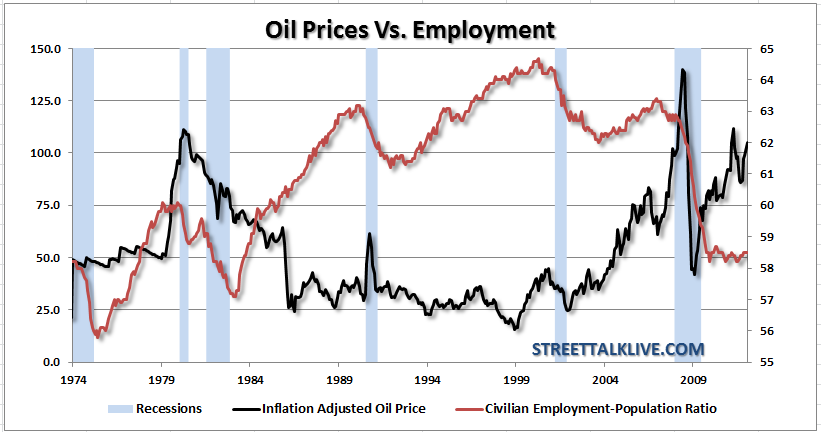
There is a bit of irony to this as well.As oil and gasoline prices rise which causes individuals to spend more on food, gasoline and utilities it shows up as an increase in consumer spending.The media then gets all excited that the consumer is spending more which is great for the economy. That is true initially, however, the as more and more of disposable income is consumed by the basics of survival - the rest of the economy will begin to suffer.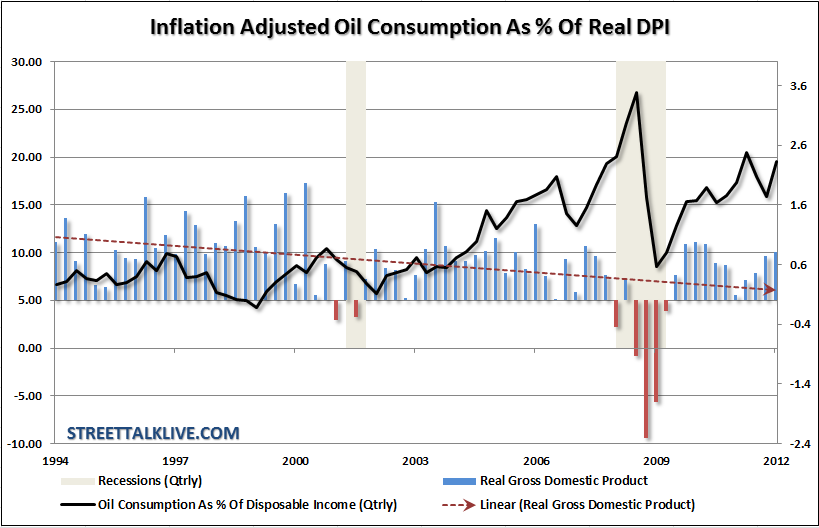
The chart shows the total consumption of oil (in millions of dollars) as a percentage of real disposable income. As oil prices increase consuming more of disposable incomes economic growth is impacted.The last time oil consumption reached 20% of DPI the economy slowed to near zero.Furthermore, and more importantly in my opinion, is that the continuing rise in oil consumption as percentage of DPI has led to a continued impedence to economic growth. This is shown by the declining linear trend of real GDP as the rise in the cost of oil consumption has consumed a larger share of a finite amount of disposable incomes.Furthermore, with year over year real disposable incomes on the decline over the last couple of years it is highly likely that an impact to the consumer will come sooner rather than later.
Maybe this is why, despite the recent bounce due to the liquidity driven surge in the financial markets, consumer confidence still remains at recessionary levels.Despite a lot of recent media rhetoric - consumers are still very despondent about the prospects of the economy as a whole.Consumer confidence has also been affected by the rises, spikes and falls of oil prices since, as stated previously, it directly impacts their ability to maintain their current standard of living.Consumer confidence will improve temporarily, as oil prices rise, as long as other areas such as employment, the financial markets, or incomes also improve concurrently. 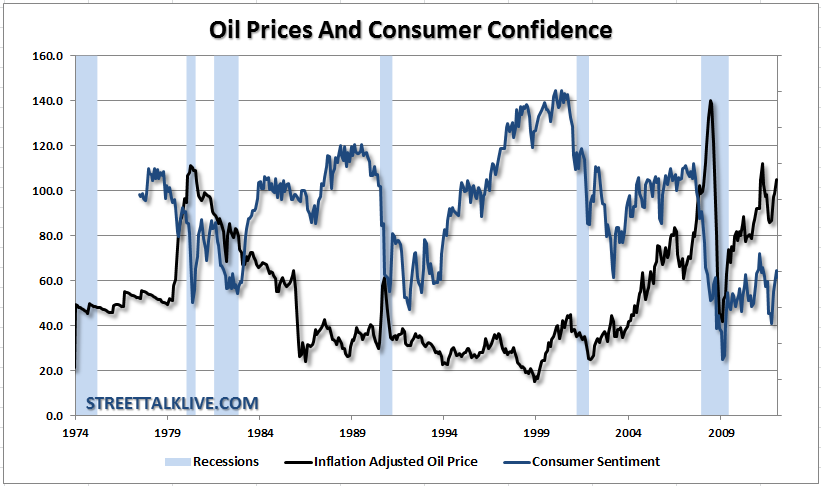
However, that improvement in confidence is generally fairly short lived as improvements in individual incomes, employment and investments are fairly finite in nature.Therefore, as the rise in oil prices begins to outpace other relative improvements - consumer confidence, along with spending and the economy, is broken.
So, with all due respect to Liz, the recent surge in oil prices has very little to due with global growth. It has recently been a function of liquidity driven speculation as we noted in our recent post on this subject. With net reportable contracts on crude oil at the second highest level on record, combined with continued infusions of liquidity into the global markets (as with the second round of LTRO today), it is only a function of time until that liquidity finds its way into the highly liquid and leveraged oil and commodity markets driving prices higher. 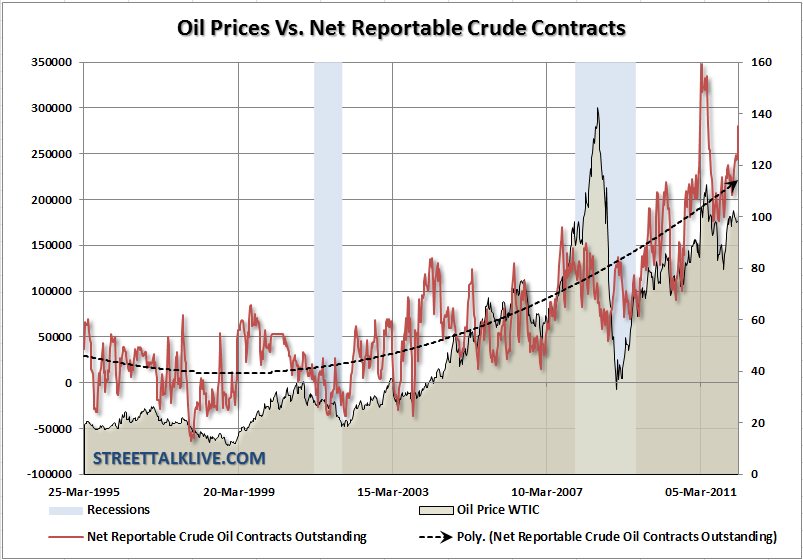
This will ultimately show up in headline consumer inflation as well as in the upcoming personal income reports as consumers divert more income into basic necessities of food and energy. This ultimately detracts from their ability to purchase other discretionary items impacting corporate earnings and will continue to pressure on already reduced profit margin expectations.
While rising oil and gasoline prices have not immediately thrown the economy "under the bus" it doesn't mean that it won't happen. With a tremendous amount of artificial intervention into the financial markets and economies on a global scale - things can remain irrational longer than most expect.The trap, however, is being complacent that "this time is different" - it never is.Furhermore, complacency can lead to far greater losses than you can imagine.
- English (UK)
- English (India)
- English (Canada)
- English (Australia)
- English (South Africa)
- English (Philippines)
- English (Nigeria)
- Deutsch
- Español (España)
- Español (México)
- Français
- Italiano
- Nederlands
- Português (Portugal)
- Polski
- Português (Brasil)
- Русский
- Türkçe
- العربية
- Ελληνικά
- Svenska
- Suomi
- עברית
- 日本語
- 한국어
- 简体中文
- 繁體中文
- Bahasa Indonesia
- Bahasa Melayu
- ไทย
- Tiếng Việt
- हिंदी
Oil Prices WILL Slow The Economy
Published 03/01/2012, 12:47 AM
Updated 02/15/2024, 03:10 AM
Oil Prices WILL Slow The Economy
3rd party Ad. Not an offer or recommendation by Investing.com. See disclosure here or
remove ads
.
Latest comments
Install Our App
Risk Disclosure: Trading in financial instruments and/or cryptocurrencies involves high risks including the risk of losing some, or all, of your investment amount, and may not be suitable for all investors. Prices of cryptocurrencies are extremely volatile and may be affected by external factors such as financial, regulatory or political events. Trading on margin increases the financial risks.
Before deciding to trade in financial instrument or cryptocurrencies you should be fully informed of the risks and costs associated with trading the financial markets, carefully consider your investment objectives, level of experience, and risk appetite, and seek professional advice where needed.
Fusion Media would like to remind you that the data contained in this website is not necessarily real-time nor accurate. The data and prices on the website are not necessarily provided by any market or exchange, but may be provided by market makers, and so prices may not be accurate and may differ from the actual price at any given market, meaning prices are indicative and not appropriate for trading purposes. Fusion Media and any provider of the data contained in this website will not accept liability for any loss or damage as a result of your trading, or your reliance on the information contained within this website.
It is prohibited to use, store, reproduce, display, modify, transmit or distribute the data contained in this website without the explicit prior written permission of Fusion Media and/or the data provider. All intellectual property rights are reserved by the providers and/or the exchange providing the data contained in this website.
Fusion Media may be compensated by the advertisers that appear on the website, based on your interaction with the advertisements or advertisers.
Before deciding to trade in financial instrument or cryptocurrencies you should be fully informed of the risks and costs associated with trading the financial markets, carefully consider your investment objectives, level of experience, and risk appetite, and seek professional advice where needed.
Fusion Media would like to remind you that the data contained in this website is not necessarily real-time nor accurate. The data and prices on the website are not necessarily provided by any market or exchange, but may be provided by market makers, and so prices may not be accurate and may differ from the actual price at any given market, meaning prices are indicative and not appropriate for trading purposes. Fusion Media and any provider of the data contained in this website will not accept liability for any loss or damage as a result of your trading, or your reliance on the information contained within this website.
It is prohibited to use, store, reproduce, display, modify, transmit or distribute the data contained in this website without the explicit prior written permission of Fusion Media and/or the data provider. All intellectual property rights are reserved by the providers and/or the exchange providing the data contained in this website.
Fusion Media may be compensated by the advertisers that appear on the website, based on your interaction with the advertisements or advertisers.
© 2007-2024 - Fusion Media Limited. All Rights Reserved.
